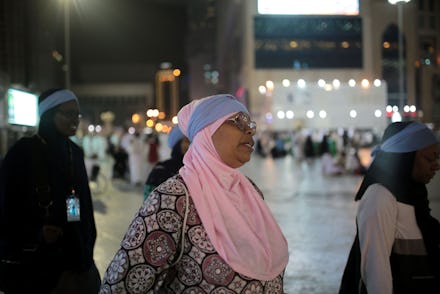U.S. Muslims Fear Backlash After Paris, But Not the Kind You Expect

Within days of last week's devastating terrorist attacks across Paris, vigilante reprisals began to pop up in cities across the globe.
In Ottawa, Canada, a mosque was set on fire in a case that authorities are already calling a potential hate crime. In Florida, police are on high alert after an anonymous caller threatened to blow up two Muslim places of worship in light of the attacks in France. Some Muslim communities have been put on the defensive, condemning Friday's carnage while also reiterating that ISIS' brand of extremism is not at all representative of their faith.
It's precisely moments like these that put the Western world's long history of Islamophobic rhetoric on full display. That's particularly the case in the United States, which has seen skyrocketing numbers of anti-Muslim hate crimes in the years since 9/11. In light of what's happened in Paris, civil rights advocates are bracing themselves for a new wave of bias, and they are working to stem the call for policies that have traditionally suppressed Muslims.
But it's not words that civil rights advocates are most afraid of. It's the policies that those words ultimately become.
"This is totally something that's happened in the past," Manzoor Cheema, executive director of a North Carolina-based group called Muslims for Social Justice, told Mic. "Now the attack in France is being portrayed and exploited by the right to propagate anti-Muslim fears."
Indeed, America's GOP presidential hopefuls were quick to react. Donald Trump said he would consider shutting down mosques if he became president. Florida Sen. Marco Rubio suggested that America stop taking in Syrian refugees altogether. Several Republican governors have already said they would ban Syrian refugees from their states -- even though they lack the legal authority to do so.
The attacks in Paris also create a particular quandary for American Muslims who are both appalled by ISIS' violence and critical of America's foreign policies. It's a delicate double standard, according to advocates who note that the burden is not shared across America's religious spectrum.
"I think that people in the these communities feel like they are put in a position where they have to explain or condemn these attacks, especially when they happen in the West," Deepa Iyer, a former trial attorney at the Civil Rights Division of the U.S. Department of Justice and author of the book We Too Sing America: South Asian, Arab, Muslim and Sikh Immigrants Shape Our Multiracial Future, told Mic. "People have noticed that other communities are not expected to issue those same calls of condemnation: White Christian communities weren't asked to apologize for Dylann Roof."
While mosques burn and words fly, a much more salient concern centers on how U.S. domestic policy will or won't be shaped by Friday's horrors.
Iyer said there's a bit more cultural consciousness these days about flat-out hate speech. "The real question is whether that national consciousness will translate into saying 'no' to policies or practices around increased surveillance," she said.
In 2001, shortly after terrorist attacks brought down the Twin Towers, New York City Police — aided and later defended by the CIA — began a secret surveillance program that mapped and monitored Muslims in and around New York City. The program reportedly sent spies into politically liberal groups and college campuses but didn't lead to any tangible results, according to the Associated Press. The NYPD later tried to justify the program by saying that Muslims' own concerns about anti-Muslim bias justified the spying.
Spying on Muslim Americans didn't just happen in New York City but also at the highest branches of the federal government. Asim Ghafoor, a first-generation American Muslim born to Indian parents in St. Louis, established himself as a decorated attorney who'd rubbed elbows with former President George W. Bush and current presidential hopeful Hillary Clinton, only to find that he'd been tracked by the NSA and FBI for years, according to the Intercept. Ghafoor, who only found out about the spying because the government mistakenly sent him proof, sued on the grounds that his civil rights had been violated and won a settlement of more than $20,000. The judgement, though, was later overturned on appeal.
"When I received a document that proved that I had been tapped [while] talking to my clients, I was shocked beyond belief," he later told the Intercept. "It's like finding out there was a peeping Tom and you just wonder, 'What else did they violate?'"
That question still lingers. "We need to see these systemic policies stop," Iyer said. "Not just for Muslims, but for the sake of all Americans of all races and faiths."